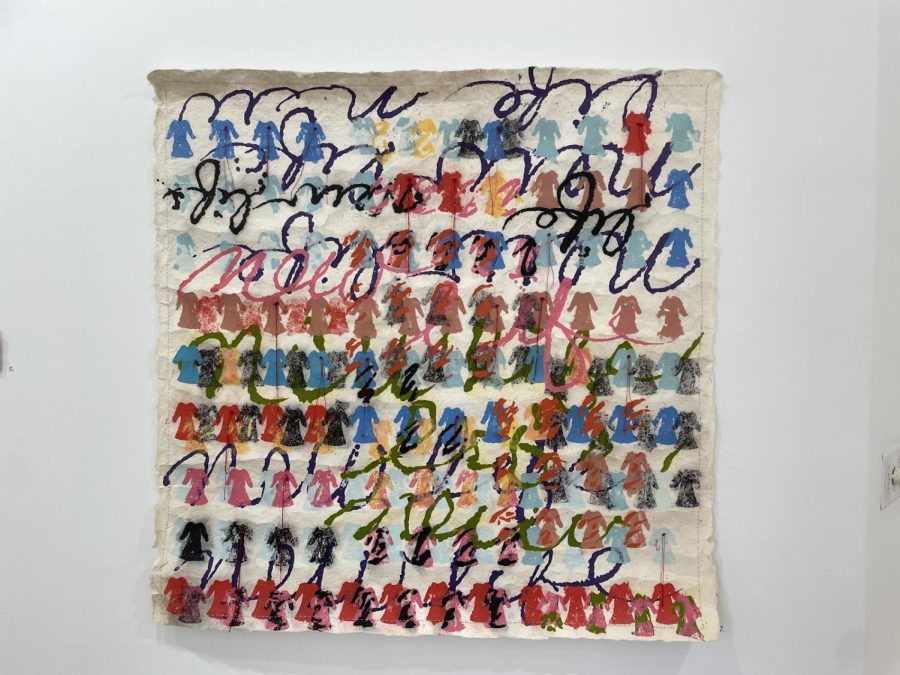“Comfort Women” Project centers survivors of sexual violence at 1100 Florence Gallery
Henry Roach/The Daily Northwestern
“New Life” by Rose Camastro-Pritchett. Camastro-Pritchett displays this piece as part of her “Comfort Women” Project at 1100 Florence Gallery.
October 20, 2021
Content warning: This story contains mentions of sexual violence.
A collection of works about survivors of sexual trauma is on display at Evanston’s 1100 Florence Gallery through Oct. 27.
“Comfort women” is the euphemism the Japanese military used to refer to women forced into sexual servitude at “comfort stations,” or brothels, for soldiers. The “Comfort Women” Project, created by international artist and Evanston resident Rose Camastro-Pritchett, depicts the history of these women during World War II in Japan and connects it to contemporary survivors of sexual violence.
“I wanted a platform for survivors, not victims. It’s really important to refer to them as survivors,” Camastro-Pritchett said. “And I wanted to show the women as survivors being strong.”
While composing the pieces, Camastro-Pritchett considered how to engage her audience without horrifying them.
“Sometimes, if things are so horrific, you have to stand away from them. Otherwise it can be overwhelming,” Camastro-Pritchett said. “But there are things that need to be said.”
Camastro-Prichett assembled the exhibition over the past eight years, beginning in 2013 when she participated in Menlo College’s “85 Years, 85 Artists” project. The college commissioned 85 artists to create art based on an assigned year, and Camastro-Pritchett’s time as an artist-in-residence at China’s Jiujiang University inspired her to focus on 1940s China. In her research, she discovered the Japanese military had set up comfort stations throughout the country that operated through the end of World War II, leading her to the stories of the comfort women.
Camastro-Pritchett said she approached the work conceptually. She sewed and embroidered a quilt with handmade paper depicting women’s robes. The quilt alludes to comfort, the hand sewing and embroidery evoke women’s work and the robes represent a garment covering the horror, according to her website.
After she finished that piece for “85 Years, 85 Artists,” Camastro-Pritchett expanded her research on comfort women. As she was invited to participate in other exhibitions, she continued making pieces about comfort women in the same medium.
“Then when I had all these, I thought, ‘Okay, I’ve got a story here.’ And that’s when I started putting the text together,” Camastro-Pritchett said.
She wanted to display the project at 1100 Florence because of Evanston’s strong sense of social justice and the street visibility of the gallery, she said.
1100 Florence curator and founder Lisa Degliantoni said she believes the gallery is well suited for the heavy subject matter. People can look from outside without entering, and if they enter, the space is small and welcoming, Degliantoni said.
“I think Rose does an exquisite job of making it very beautiful and intimate so that you might walk away from this exhibit and be willing to learn more,” Degliantoni said.
The 1100 Florence exhibition also includes the interactive “Breaking the Silence: Message Board” installation, where patrons can submit comments or feelings about sexual violence in person or via QR code.
The gallery displays the messages in the window for passersby to read, showcasing similarities between statements of comfort women survivors and present-day survivors of sexual violence. Degliantoni said this allows people to share their story in a private, yet public way.
The message board began at Menlo College as a collaboration between Camastro-Pritchett and her students. Camastro-Pritchett created another message board for the Awakenings art gallery in Chicago with University of Chicago students when Awakenings hosted the exhibit “Embodying Justice” about comfort women.
With two helpers, Camastro-Pritchett then copied each message by hand to display on the matching message board at 1100 Florence. The two message boards are connected through an interactive platform on Awakenings’ website.
On Oct. 10, 1100 Florence also hosted a “Making Art About Horrific Subjects” panel in which Camastro-Pritchett participated as a speaker. The panel also featured Sung Sohn, co-founder and executive director of the Education for Social Justice Foundation, and Jeri Frederickson, poet and creative director of Awakenings.
Sohn told The Daily she discussed the public awareness of the Japanese military sexual slavery system. She said she has also been making efforts in San Francisco to preserve comfort women’s history.
“We’re all doing this to focus on countering sexual violence, and Rose and I are relying on the history of comfort women to communicate the necessity of doing it,” Sohn said. “I am just trying to help (survivors) amplify and carry out their voices, and I think Rose’s artwork really helped make that communication clear.”
Correction: A previous version of this story misstated the topic of Sohn’s discussion at the panel. The Daily regrets the error.
Email: [email protected]
Related Stories:
— New virtual Dittmar exhibit documents 12 months of the pandemic
— Terrain Biennial festival features 23 pieces of art around Evanston












